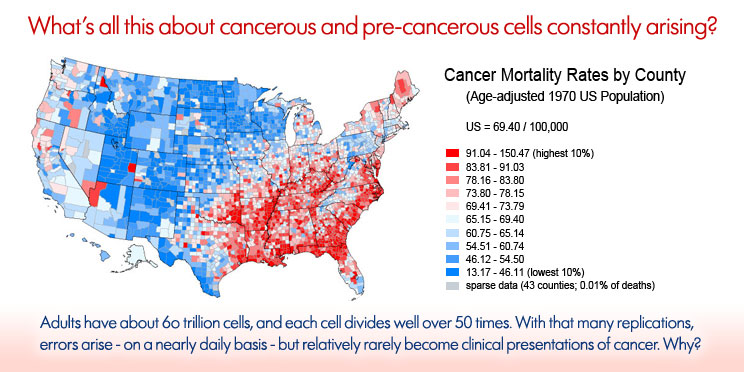On average, how often do Cancerous Cells arise?
A fully grown human has some 60 trillion cells. And on average, each of these cells will divide over 50 times in its lifetime. Statistically, the process of DNA replication, by which copies of the genes are passed to the newly divided cells, is not perfect. It is error-prone. Cells have many mechanisms to help resolve these errors. But inevitably, some cells will accumulate errors, especially as we age. Most serious errors simply kill the cell. Unfortunately, some cells may have broken, malfunctioning genes, and still survive. Some of these cells start to divide without the proper controls that most cells have in place. These are cancer cells. Given the huge number of cells in the human body, it is a near statistical certainty that nearly every day the human body will make a few pre-cancerous or cancer cells.
If Cancerous Cells regularly arise, why isn't there more Cancer?
If we make cancer cells nearly every day, and these cells can start to divide without control, why is that we don't all get cancer all the time? The answer is complex, and not fully understood. However, one of the major reasons is because our immune system is on the job 100% of the time, every minute of every day, looking over each cell in the body. Every day, macrophages, natural killer cells, T-cells, cytotoxic T-cells, move through the tissues of our bodies searching out dangerous cells. And when they find them, the immunocytes destroy the cancer cell without any mercy. This process is called "immune surveillance" or "immunosurveillance". In healthy circumstances, all of the cancer cells that regularly arise are detected and destroyed by the bodies' "immunosurveillance" system. Unfortunately for the cancer patient, one of these cells has avoided detection by the "immunosurveillance" system.
What can be done about this?
At Reveal, we see cancer rates as the rate at which the immune system fails to police the body. We think this failure is often facilitated by the cloaking cytokines that are secreted by the cancer cells themselves. We see our job as helping the process of immunosurveillance so that every patient may eventually defeat their cancer.
